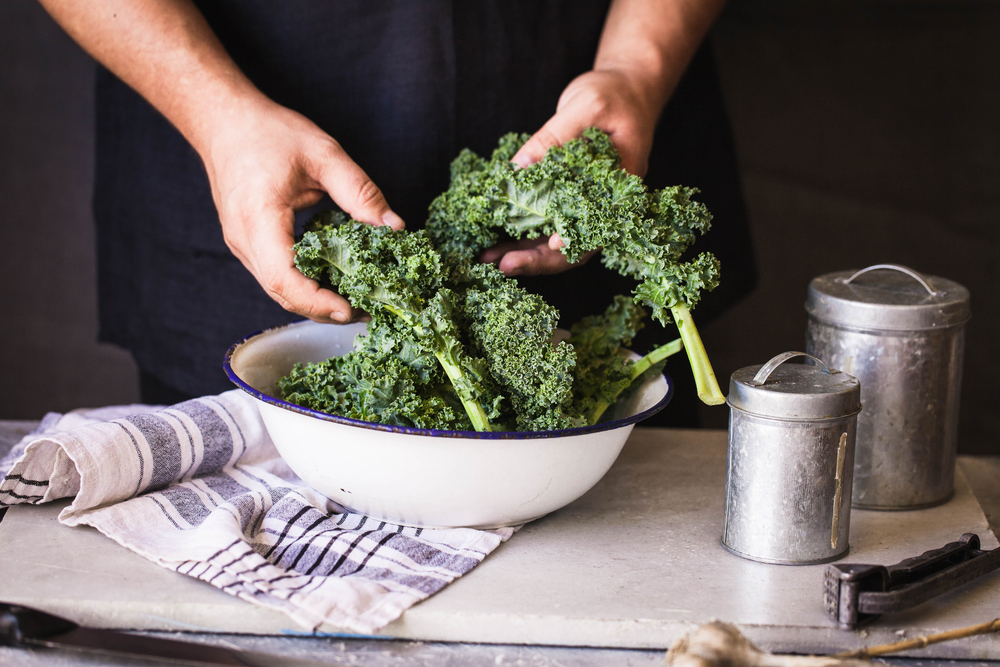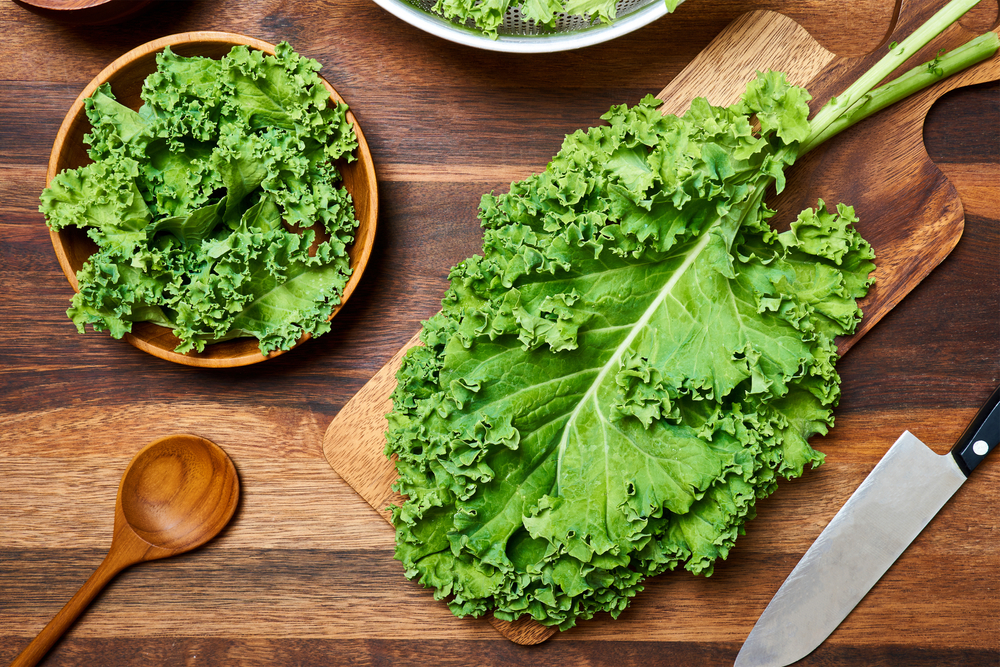As a versatile and nutritious vegetable, cabbage is a staple in many cuisines around the world. However, there are times when you may need to substitute cabbage for various reasons.
Fortunately, there are several cabbage substitutes that you can use to achieve similar flavors and textures in your dishes.
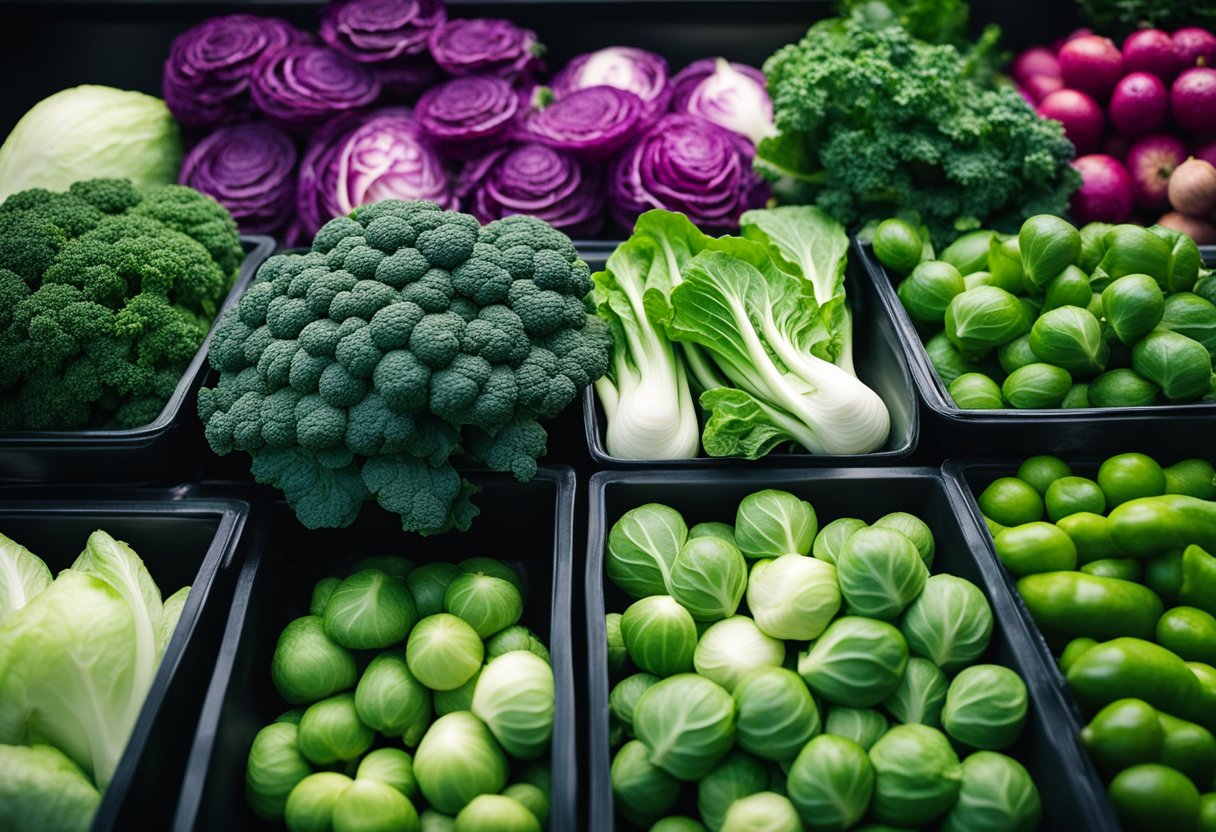
Understanding the different types of cabbage and their unique characteristics can help you choose the best substitute for your recipe. Common cabbage substitutes include kale, bok choy, Brussels sprouts, Napa cabbage, and choy sum, among others.
Each of these vegetables has its own distinct flavor and texture, so it’s important to choose a substitute that complements the other ingredients in your dish.
Whether you’re looking to add more variety to your meals or simply want to experiment with different flavors and textures, there are plenty of cabbage substitutes to choose from.
By understanding the different options available and their unique characteristics, you can easily find the perfect substitute for your recipe.
Key Takeaways
- There are several cabbage substitutes that can be used in various dishes.
- Understanding the different types of cabbage and their unique characteristics can help you choose the best substitute for your recipe.
- Common cabbage substitutes include kale, bok choy, Brussels sprouts, Napa cabbage, and choy sum, among others.
Understanding Cabbage
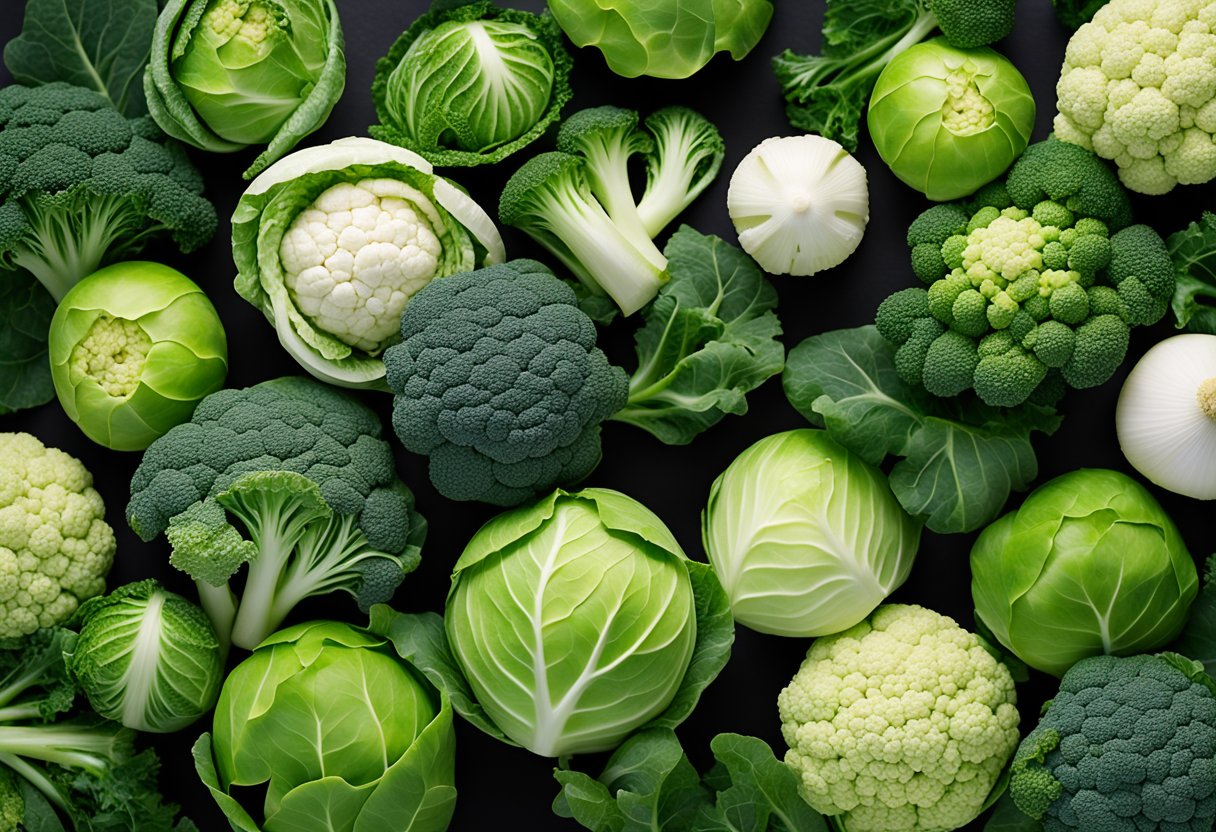
Cabbage is a leafy green vegetable that belongs to the Brassica oleracea family, which also includes broccoli, cauliflower, and Brussels sprouts.
It is a versatile vegetable that can be eaten cooked or raw, and it comes in different varieties such as green cabbage, purple cabbage, and savoy cabbage.
Cabbage heads are typically round in shape and can weigh anywhere from 1 to 8 pounds. The leaves of the cabbage are thick and have a slightly bitter taste, which can vary depending on the variety of cabbage.
Raw cabbage is commonly used in salads and slaws, while cooked cabbage is a staple ingredient in many dishes such as soups, stews, and stir-fries.
Savoy cabbage is a type of cabbage that has crinkled leaves and a milder flavor compared to green and purple cabbage. It is often used in dishes that require a more delicate flavor and texture, such as stuffed cabbage rolls.
While cabbage is a popular vegetable, there are times when you may need to substitute it in a recipe. Some common cabbage alternatives include kale, bok choy, kohlrabi, choy sum, Brussels sprouts, Napa cabbage, celery, endives, iceberg lettuce, and green beans.
These substitutes can be used in a variety of dishes, including salads, stir-fries, and soups.
In summary, cabbage is a nutritious and versatile vegetable that can be used in a variety of dishes.
While there are times when you may need to substitute it in a recipe, there are plenty of cabbage alternatives that can be used to achieve a similar flavor and texture.
Health Benefits of Cabbage
I have researched and found that cabbage is highly nutritious and offers several health benefits. Here are some of the key benefits:
- Low in calories: Cabbage is a low-calorie vegetable that can help with weight management. One cup of chopped cabbage contains only 22 calories.
- High in vitamins and minerals: Cabbage is an excellent source of vitamins C and K, and also contains small amounts of vitamin A, iron, calcium, potassium, manganese, magnesium, and folate.
- Heart-healthy: Cabbage contains compounds that can help reduce the risk of heart disease. For example, it is rich in anthocyanins, which are antioxidants that can help lower blood pressure and improve cardiovascular health.
- Boosts immune function: Cabbage is a good source of vitamin C, which is essential for a healthy immune system. It also contains quercetin, a flavonoid that has anti-inflammatory and immune-boosting properties.
- May reduce cancer risk: Some studies have suggested that eating cabbage may help reduce the risk of certain types of cancer, such as colon and lung cancer.
- May improve digestion: Cabbage is high in fiber, which can help promote healthy digestion and prevent constipation.
- May improve brain function: Cabbage contains choline, a nutrient that is important for brain health. Choline is essential for the production of neurotransmitters that are involved in memory and mood regulation.
Overall, cabbage is a highly nutritious vegetable that offers several health benefits. Adding it to your diet can help improve your overall health and well-being.
Common Cabbage Substitutes
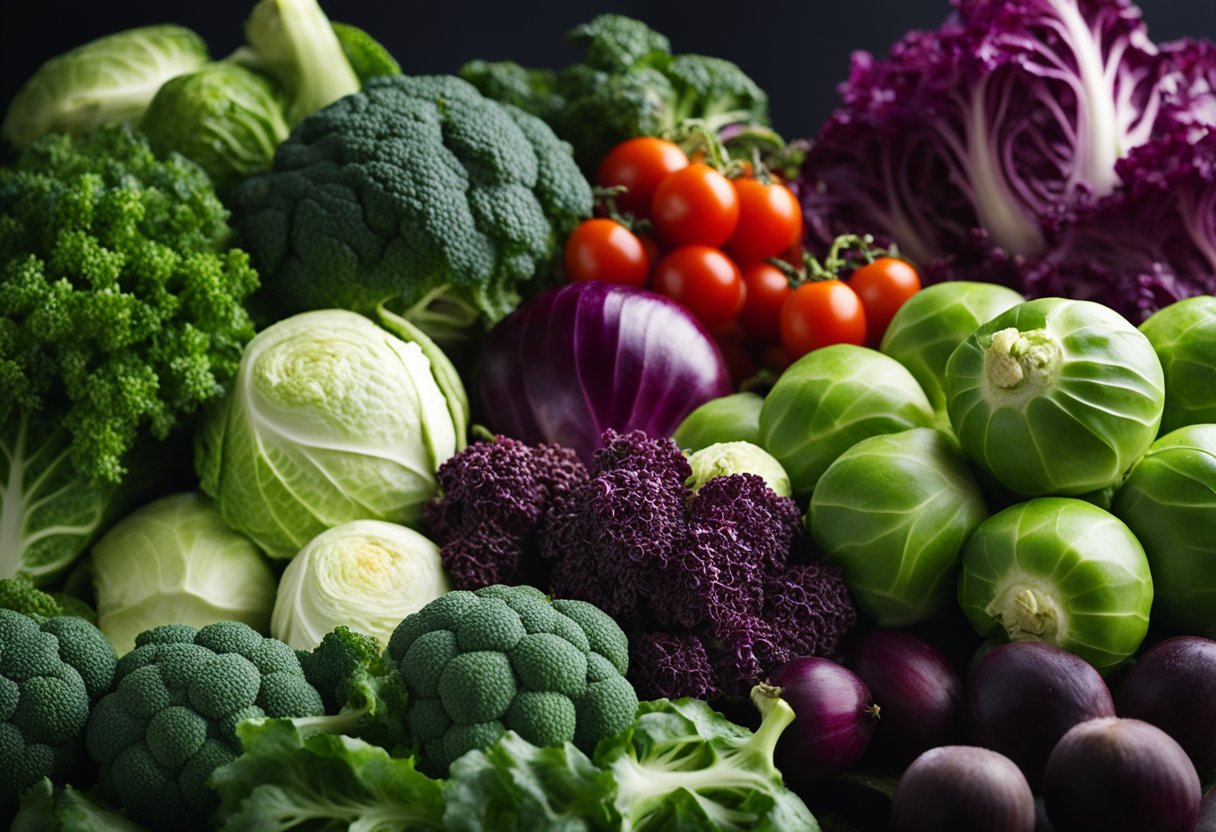
When it comes to substituting cabbage, there are many options available. Some of the most common cabbage substitutes include kale, bok choy, broccoli, savoy cabbage, brussels sprouts, choy sum, napa cabbage, Chinese cabbage, kohlrabi, celery, endives, iceberg lettuce, green beans, baby kale, turnip, leafy green vegetable, cauliflower, zucchini, pak choy, radish, collard greens, and yu choy.
Kale is a popular cabbage substitute that is packed with nutrients and has a similar texture to cabbage. Bok choy is another great option that can be used in stir-fries, soups, and salads. Broccoli is a cruciferous vegetable that can be used as a cabbage substitute in coleslaw or other dishes.
Savoy cabbage is a type of cabbage that has crinkly leaves and a milder flavor than regular cabbage. Brussels sprouts are another cruciferous vegetable that can be used as a cabbage substitute in dishes like stir-fries and salads.
Napa cabbage is a type of Chinese cabbage that is commonly used in Asian cuisine. It has a mild flavor and a tender texture that makes it a great substitute for regular cabbage in dishes like kimchi and stir-fries.
Kohlrabi is a member of the cabbage family that has a similar flavor to cabbage but a milder, sweeter taste. It can be used in dishes like coleslaw and stir-fries.
Celery is a crunchy vegetable that can be used as a cabbage substitute in salads and soups. Endives are a type of leafy green vegetable that has a slightly bitter taste and can be used in salads or as a garnish.
Iceberg lettuce is a crisp, crunchy lettuce that can be used as a cabbage substitute in salads or sandwiches. Green beans are a versatile vegetable that can be used in a variety of dishes, including stir-fries and salads.
In summary, there are many common cabbage substitutes available, including kale, bok choy, broccoli, savoy cabbage, brussels sprouts, choy sum, napa cabbage, Chinese cabbage, kohlrabi, celery, endives, iceberg lettuce, green beans, baby kale, turnip, leafy green vegetable, cauliflower, zucchini, pak choy, radish, collard greens, and yu choy.
Each of these substitutes has its own unique flavor and texture, making them suitable for different types of dishes.
Cabbage Substitute in Different Dishes
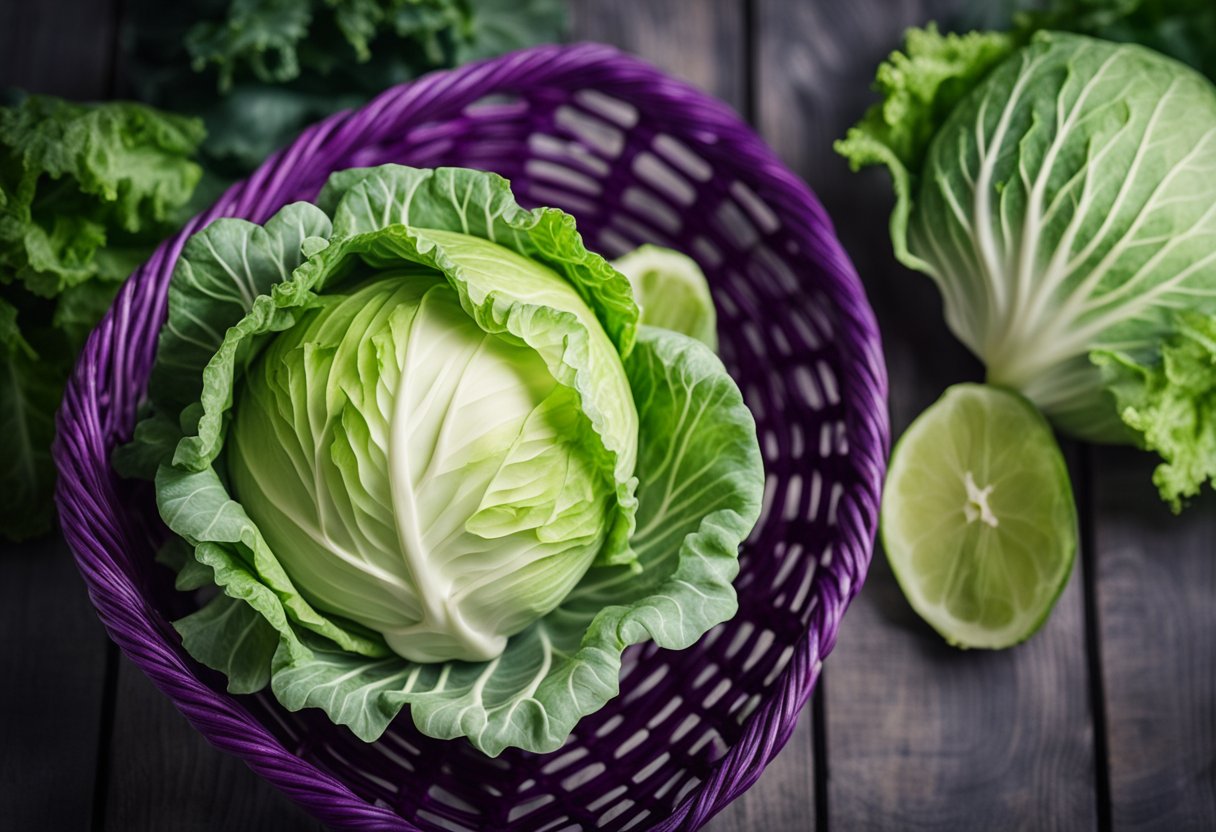
As a chef, I have experimented with different substitutes for cabbage in various dishes. Here are some of my findings:
Soups and Stews
When it comes to soups and stews, Napa cabbage is an excellent substitute for regular cabbage. Its texture and flavor are similar to cabbage, but it is less dense and has a milder taste. Bok choy is also a great option, especially in Asian-style soups and stews.
Salads
For salads, I recommend using kale or Brussels sprouts instead of cabbage. Both of these greens are sturdy and can hold up well in salads, even when dressed. If you want a milder flavor, try using endives or iceberg lettuce.
Stir-Fries
In stir-fries, bok choy is an excellent substitute for cabbage. Its delicate leaves and crunchy stalks add a unique texture to stir-fries. You can also use Napa cabbage, but it is a bit more delicate and can become mushy if overcooked.
Slaw and Coleslaw
If you’re making slaw or coleslaw, try using shaved Brussels sprouts or kale instead of cabbage. Both of these greens have a similar texture to cabbage and can hold up well when dressed.
You can also use Napa cabbage, but it has a more delicate texture and can become mushy if over-dressed.
Kimchi
Kimchi is a traditional Korean dish made with cabbage. However, you can also use Napa cabbage or bok choy to make kimchi.
Napa cabbage has a similar texture to regular cabbage and is commonly used in Korean cuisine. Bok choy has a milder flavor, but its texture is similar to Napa cabbage.
Steamed, Boiled, Baked, and Fried
For steamed, boiled, baked, and fried dishes, I recommend using Brussels sprouts or Napa cabbage instead of regular cabbage.
Both of these greens have a similar texture to cabbage and can hold up well when cooked. You can also use bok choy, but it is more delicate and can become mushy if overcooked.
In conclusion, there are many substitutes for cabbage that you can use in various dishes. Experiment with different greens and find the ones that work best for your recipes.
Cabbage Substitute in Asian Cuisine
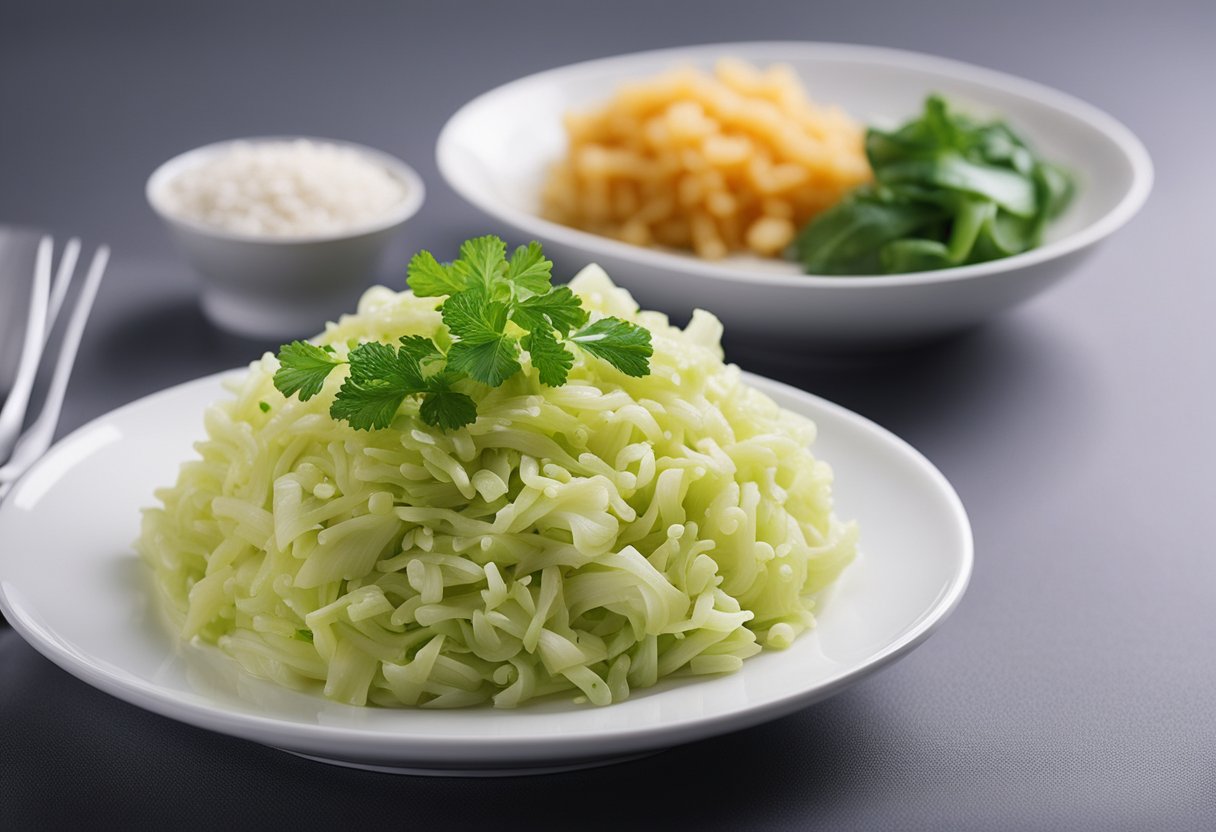
As someone who enjoys cooking Asian cuisine, I know how important cabbage is in many dishes.
However, sometimes it can be hard to find fresh cabbage or you may want to switch things up and try a different flavor. Luckily, there are several great substitutes for cabbage in Asian cuisine.
One of the most popular substitutes for cabbage in Asian cuisine is pak choy. This leafy green vegetable is similar in taste and texture to cabbage, but with a slightly bitter flavor.
It is often used in stir-fries, soups, and stews. Pak choy is also a good source of vitamins A and C, as well as calcium and iron.
Another great substitute for cabbage in Asian cuisine is yu choy. This vegetable is a type of Chinese greens that has a slightly sweet flavor and tender leaves.
It is often used in stir-fries and soups and pairs well with savory sauces. Yu choy is also a good source of vitamins A and C, as well as calcium and iron.
If you are looking for a substitute for Chinese cabbage specifically, there are several options. Bok choy is a popular choice, with its mild flavor and crunchy texture.
Napa cabbage is another option, with its delicate flavor and tender leaves. Both of these vegetables are often used in stir-fries, soups, and salads.
In summary, there are several great substitutes for cabbage in Asian cuisine, including pak choy, yu choy, bok choy, and Napa cabbage. These vegetables offer similar flavors and textures to cabbage, making them great alternatives in many dishes.
Texture and Flavor of Cabbage Substitutes
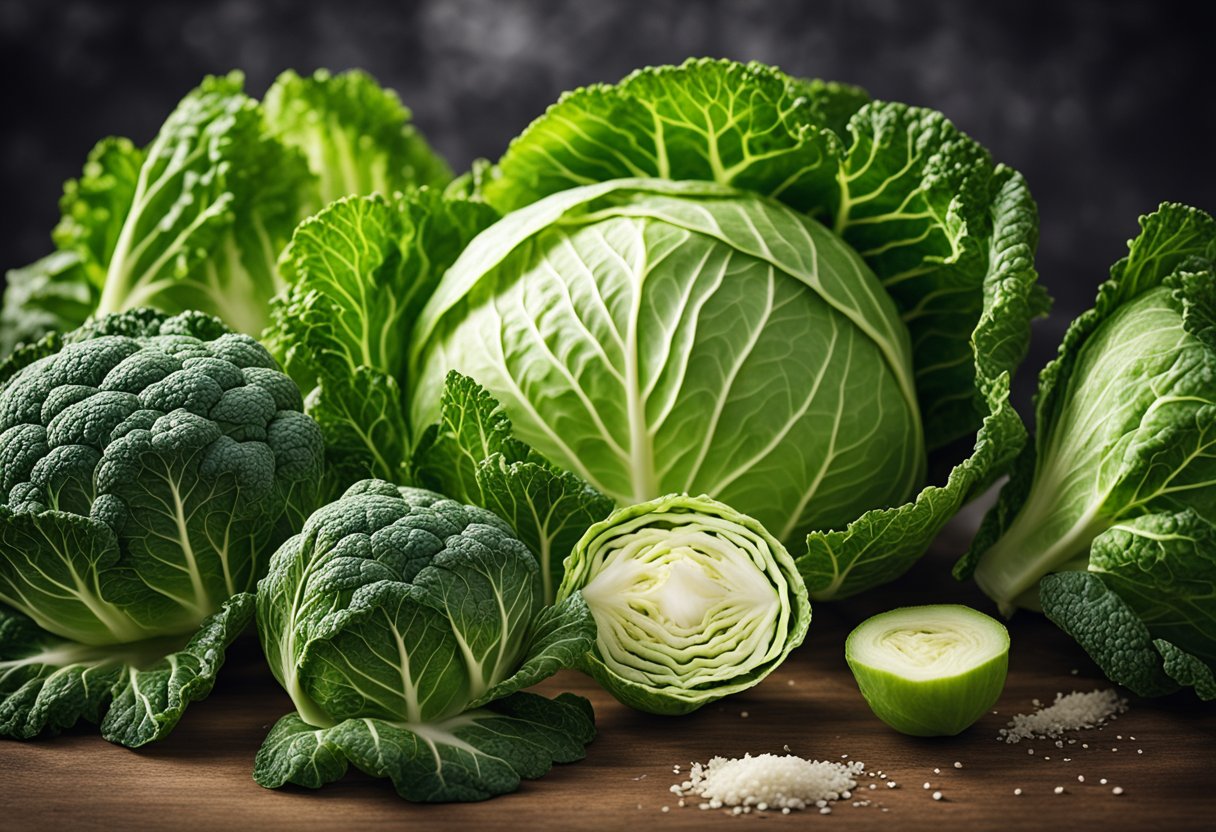
As a cook, I know that the texture and flavor of ingredients can make or break a dish. When it comes to substituting cabbage, it’s important to consider both of these factors. Fortunately, there are many options that can mimic the texture and flavor of cabbage.
For those looking for a milder flavor, bok choy is a great option. It has a similar texture to cabbage, but with a milder, sweeter taste.
Similarly, Napa cabbage has a tender texture and a pale yellow color, making it a great substitute for recipes that call for savoy cabbage.
If you’re looking for a richer taste, Brussels sprouts are a great option. They have a firm texture and a unique, earthy flavor that can add depth to your dish. Another option for a savory cabbage substitute is endive, which has a tender texture and a slightly bitter taste.
For those looking for a texture similar to cabbage, but with a slightly different flavor profile, kale is a great option. It has a firm texture and a slightly bitter taste, making it a great option for salads or stir-fries.
Similarly, choy sum has a tender texture and a slightly sweet flavor, making it a great option for Asian-inspired dishes.
In summary, there are many options for substituting cabbage in your recipes. Whether you’re looking for a milder flavor, a richer taste, or a texture similar to cabbage, there are many options to choose from.
By considering the texture and flavor of each substitute, you can find the perfect ingredient to enhance your dish.
Understanding the Nutritional Value of Cabbage Substitutes
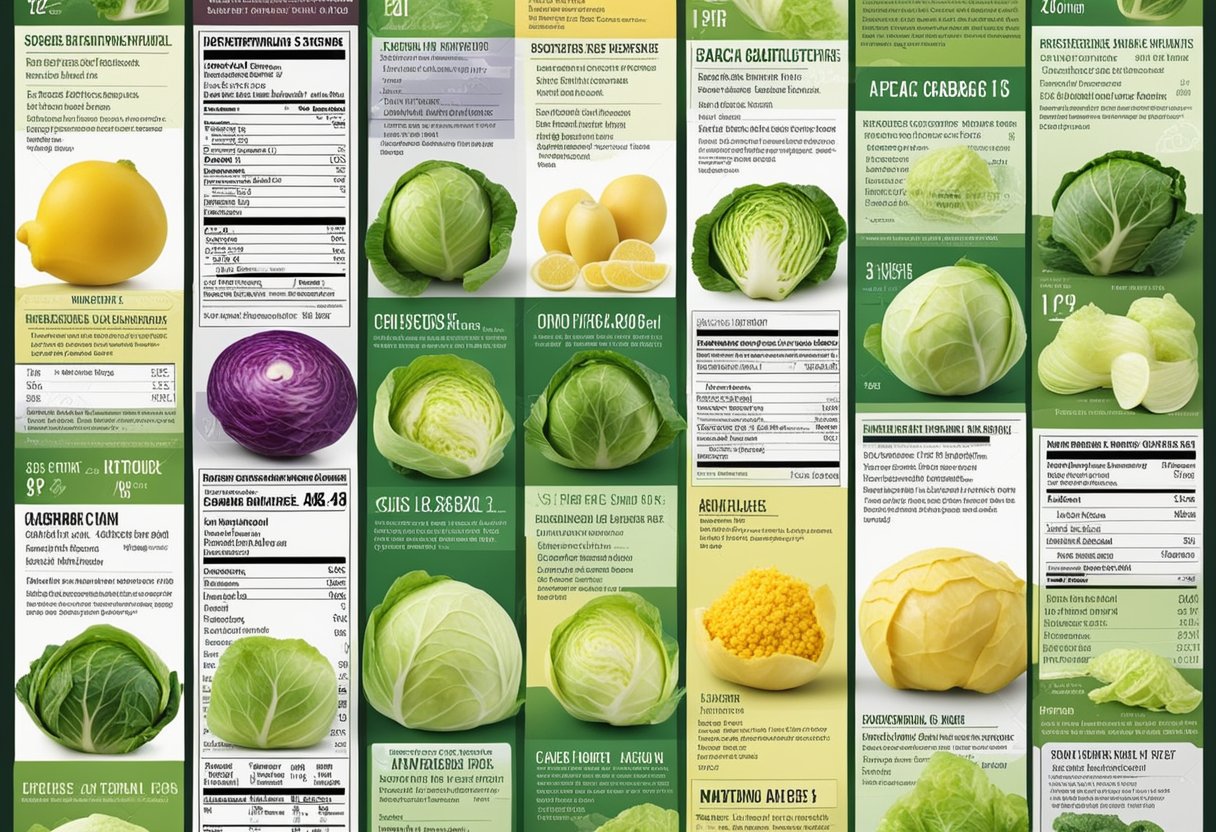
As a nutritionist, I understand the importance of a balanced diet that includes a variety of fruits and vegetables.
Cabbage is a nutritious and versatile vegetable that can be used in a variety of dishes. However, if you are looking for a substitute for cabbage, there are several options available that are equally nutritious.
One of the key nutrients found in cabbage is vitamin C, which is essential for maintaining a healthy immune system and promoting healthy skin.
Napa cabbage is a great substitute for cabbage and is also an excellent source of vitamin C. One cup of chopped Napa cabbage contains approximately 34% of the recommended daily intake of vitamin C.
Another important nutrient found in cabbage is iron, which is essential for the production of red blood cells. Bok choy is a great substitute for cabbage and is also an excellent source of iron.
One cup of chopped bok choy contains approximately 16% of the recommended daily intake of iron.
Calcium is another important nutrient found in cabbage, which is essential for maintaining healthy bones and teeth.
Swiss chard is a great substitute for cabbage and is also an excellent source of calcium. One cup of chopped Swiss chard contains approximately 10% of the recommended daily intake of calcium.
Potassium is a mineral that is essential for maintaining healthy blood pressure levels. Kale is a great substitute for cabbage and is also an excellent source of potassium. One cup of chopped kale contains approximately 8% of the recommended daily intake of potassium.
Manganese is a mineral that is essential for maintaining healthy bones and promoting wound healing. Broccoli is a great substitute for cabbage and is also an excellent source of manganese. One cup of chopped broccoli contains approximately 10% of the recommended daily intake of manganese.
Magnesium is a mineral that is essential for maintaining healthy muscles and promoting relaxation. Spinach is a great substitute for cabbage and is also an excellent source of magnesium.
One cup of chopped spinach contains approximately 6% of the recommended daily intake of magnesium.
Folate is a B-vitamin that is essential for maintaining healthy red blood cells and promoting healthy fetal development during pregnancy.
Arugula is a great substitute for cabbage and is also an excellent source of folate. One cup of chopped arugula contains approximately 8% of the recommended daily intake of folate.
Lastly, cabbage is low in calories, making it an excellent addition to any diet. If you are looking for a low-calorie substitute for cabbage, try using lettuce or kale instead.
One cup of chopped lettuce contains approximately 5 calories, while one cup of chopped kale contains approximately 33 calories.
Overall, there are several nutritious substitutes for cabbage that can be used in a variety of dishes. By incorporating these substitutes into your diet, you can still enjoy the health benefits of cabbage while adding variety to your meals.
Specific Cabbage Substitutes
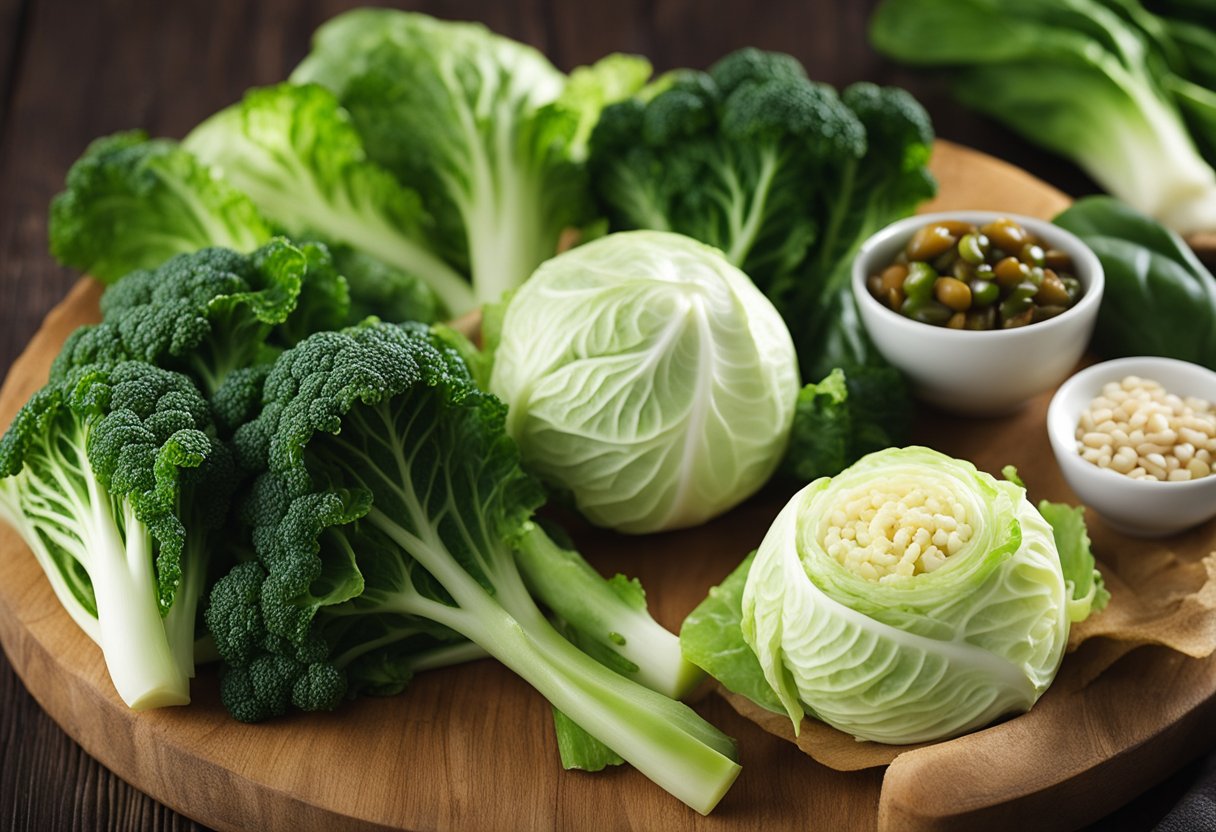
When it comes to finding a substitute for green cabbage, there are plenty of options available. Here are some of my go-to cabbage substitutes for slaw and other dishes:
- Kale: This leafy green vegetable is a great substitute for cabbage in slaw. It has a similar texture and is packed with nutrients like vitamin C and K. You can use either curly or lacinato kale, depending on your preference.
- Bok Choy: Another great substitute for cabbage in slaw is bok choy. It has a milder flavor and a lighter texture, but still provides a good crunch. Bok choy is also a good source of vitamins A and C.
- Napa Cabbage: Napa cabbage, also known as Chinese cabbage, is a common ingredient in Asian cuisine. It has a sweeter taste and a more delicate texture than green cabbage, making it a good substitute in slaw. Napa cabbage is also a good source of vitamin C.
- Brussels Sprouts: If you’re looking for a cabbage substitute that’s a little more unique, try using Brussels sprouts. They have a similar texture and a slightly bitter taste, but can add a nice crunch to slaw. Brussels sprouts are also high in vitamin C and K.
- Endives: Endives are a great substitute for cabbage in salads. They have a slightly bitter taste and a crunchy texture, making them a good addition to any salad. Endives are also a good source of fiber and vitamin C.
Overall, there are plenty of cabbage substitutes available that can be used in a variety of dishes. Whether you’re making slaw or salad, these alternatives can provide a similar texture and taste to cabbage, while also offering unique flavors and nutrients.
Conclusion
In conclusion, there are several substitutes for cabbage that can be used in various dishes. Kale, Bok Choy, Kohlrabi, Choy sum, Savoy cabbage, Brussels sprouts, Napa cabbage, Celery, Endives, Iceberg lettuce, and Green beans are some of the best substitutes for cabbage.
Each of these substitutes has its unique flavor and texture, making them suitable for different types of recipes.
For example, kale is a great substitute for cabbage in salads, soups, and stir-fries. It has a slightly bitter taste and a chewy texture that adds depth to any dish.
Napa cabbage, on the other hand, is a great substitute for cabbage in dishes that require a delicate, sweet flavor with a crisp texture. It is commonly used in East Asian cuisine and is perfect for making kimchi or stir-fries.
Brussels sprouts and green beans are also great substitutes for cabbage in dishes that require a crunch. They can be roasted, sautéed, or steamed and used in salads, stir-fries, or side dishes.
Endives and iceberg lettuce are perfect substitutes for cabbage in salads and sandwiches. They have a mild flavor and a crunchy texture that adds freshness to any dish.
Overall, the choice of substitute for cabbage depends on the recipe and personal preference. Experimenting with different substitutes can lead to new and exciting flavors and textures.
Frequently Asked Questions
What are some alternatives to Chinese cabbage for kimchi?
If you can’t find Chinese cabbage, also known as Napa cabbage, you can use other types of cabbage like green cabbage or savoy cabbage.
You can also use other leafy greens like bok choy, mustard greens, or even kale. Just keep in mind that the taste and texture of your kimchi will be different.
What can I use as a substitute for Taiwanese cabbage?
If you can’t find Taiwanese cabbage, also known as Michihili cabbage, you can use other types of cabbage like green cabbage or Napa cabbage.
You can also use other leafy greens like bok choy or even lettuce. Just keep in mind that the taste and texture of your dish will be different.
Can I use Brussels sprouts instead of cabbage?
Yes, you can use Brussels sprouts instead of cabbage in some dishes like coleslaw or stir-fry. Just slice them thinly or shred them using a food processor or mandoline.
What are some substitutes for cabbage in egg rolls?
If you don’t have cabbage, you can use other vegetables like carrots, bean sprouts, or mushrooms. You can also use leafy greens like spinach or kale. Just make sure to chop them finely so that they cook evenly.
Are there any green vegetables similar to cabbage?
Yes, there are several green vegetables that are similar to cabbage like bok choy, broccoli, Brussels sprouts, kale, and collard greens. They all belong to the same family of vegetables called Brassicaceae.
What can I use instead of cabbage in a sandwich?
If you want to add some crunch to your sandwich, you can use other vegetables like lettuce, spinach, or arugula. You can also add some sliced cucumbers or bell peppers for extra flavor and texture.


